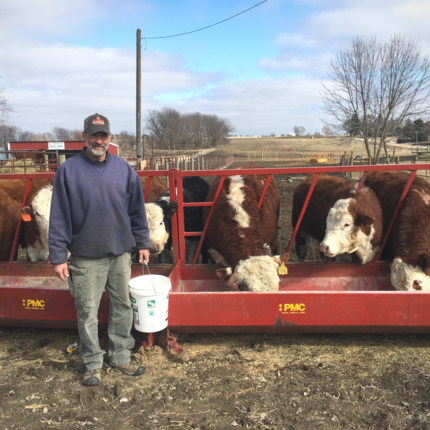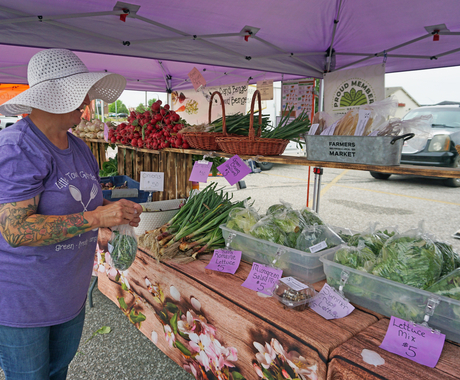By Kate Hansen, former staff member. Jorgen Rose, Practical Farmers of Iowa, contributed to this story
Published in the Iowa Farmer Today on March 8, 2020
WEBSTER CITY, IOWA — “The future of the small farmer is to be innovative — there’s no question about that,” said Larry Haren of Webster City, Iowa.
Larry has always sought to be innovative in his operation, which includes row crops, hay and raising registered Polled Herefords. Over the last decade, he has implemented conservation practices with support from the Environmental Quality Incentives Program (EQIP).
Administered by the Natural Resources Conservation Service, EQIP provides financial and technical assistance for a variety of conservation practices. The program is currently accepting applications for the coming year, with the deadline in Iowa set for March 20. Those interested in the program should contact their local NRCS office as soon as possible.
Over the years, Larry has used EQIP to implement multiple conservation practices. He installed fencing as part of a rotational grazing plan, rerouted water to create a 3-acre wetland, and monitored the effectiveness of a bioreactor on his land.
But perhaps the most impactful practice was cover crops, which Larry plants following his soybean crop in the fall and then grazes his cattle on.
“I probably wouldn’t have done [cover crops] without EQIP,” he said. “It was the incentive that made it an easy choice.”
For producers interested in learning more, it is important to note EQIP is a program fundamentally designed around resource concerns. NRCS looks at national, state and local resource concerns when determining its priorities for funding. State priorities for Iowa include surface and subsurface water quality related to animal feeding operations, plant condition and management to protect and improve pastureland (including soil erosion control), and wildlife management to protect at-risk wildlife species.
In Larry’s case, his EQIP contract for cover crops addressed nonpoint source pollution, reduction in soil erosion and sedimentation, and conservation of ground and surface water resources, all of which are national EQIP priority resource concerns.
Years after his first EQIP contract, Larry is still planting cover crops because of the benefits he has observed.
“For me, a benefit is grazing,” Larry said. “It’s free feed, so to speak. But, soil health is the biggest thing.”
Before going to their local NRCS office to discuss EQIP, farmers should think about the resource concerns on their operation, and bring ideas for potential ways to address them. While new jargon about conservation practices and standards may seem complex, producers should not be afraid to ask questions and stay focused on what they want to accomplish.
For Larry, the benefits of participation in EQIP are clear.
“EQIP helps open people’s eyes to new practices and opportunities for them,” he said.
Although EQIP applications are accepted year around, there is a March 20 deadline to secure funding this year. Producers and landowners interested in learning more should contact their local NRCS office, or reach out to the Center for Rural Affairs or Practical Farmers of Iowa.



